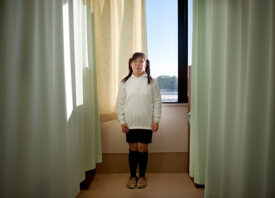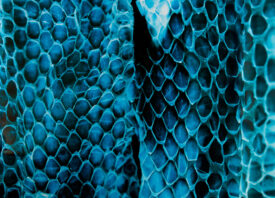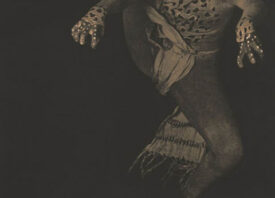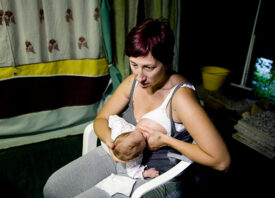Search this site
‘The Other Side of the American Dream’: Powerful Portraits Document the Abuse of Migrants Passing Through Mexico
Mariana, 29 years old, Honduras. She was assaulted during her crossing as an undocumented person through mexico, with the intent to arrive in the United States. She was pushed by the assailants into a ravine, and was able to avoid an attempted rape. Mariana’s travel companion was beaten when she attempted to defend her. She was moved to a hospital in Tenosique, Tabasco, and then three others where they did not perform the necessary operation. Fifteen days had passed (8 days were in a Hospital in Villahermosa, Tabasco) and the operation became urgent. The last doctor that saw her only requested a new splint and a call to immigration. – Tapachula, Chiapas, 2010.
Teofilo Santos Rivera, 42, Panamá. He was the victim of an attempted mass assault by gang members during the crossing through Mexico. He jumped off the roof of the train, hurting his feet. Also suffers from liver cirrhosis and a cancerous sore on the back. In January 2014, the doctor gave him only 40 days to live. His idea is to reach his children and grandchildren in the U.S. to say goodbye. – Tapachula, Chiapas, 2014.
For Al Otro Lado del Sueño, or The Other Side of the American Dream, photographer Nicola “Ókin” Frioli catalogues the heartbreak and devastation suffered by migrant families and individuals seeking security and stability in the United States. Having left El Salvador, Honduras, Guatemala, or Nicaragua in hopes of escaping violence and creating better lives for their families, a great number of men, women, and children pass through Mexico.
Through this treacherous passage, many are subjected to violent beatings, sexual abuse, kidnappings, and murder at the hands of the country’s gangs, including the Maras Salvatruchas, and corrupt officials operating within the system. Migrants often lose limbs under the heavy wagons of a vehicle known simply as “the beast,” a cargo train that transports them across the country in hopes of reaching the US.
Frioli began his project in 2008 by visiting the Shelter Jesus Buen Pastor in Tapachula, Chiapas, one of Mexico’s Catholic shelters offering aid and medical care to injured migrants. Years later, he photographed in the Shelter of the Padre Solalinde, an Oaxaca-based shelter that provides short-term care for migrants. Here, Frioli gives a potent voice to these persons whose struggles remain largely invisible to the global public.
In his stark images, the injured stand alone, confronting the fact that their bodies are irrevocably altered; for some, the loss of limbs has made it nearly impossible to work and provide for their families. Under Frioli’s dignified spotlight, they appear wounded but resilient, imbued with a palpable desire to endure. As their wounds fade to scars, their personal possessions remain alone against blackness, becoming lasting reminders of a shared humanity that transcends all borders.

Wheelchair, adapted from a plastic garden seat. It is a work donated by the International Organization – Free Wheelchair Mission – (www.freewheelchair.org) to to the shelter “Jesus el Buen Pastor” in Tapachula. – Tapachula, Chiapas, 2008.
Al Otro Lado del Sueño has been exhibited by Spain’s Instituto Cervantes de Madrid as part of Resilencia from 2009 to 2011 and in the Expo Fotoperiodismo the following year. In 2013, Frioli was chosen by the Bancomer BBVA Foundation as a grant recipient of the Fund to Support the Promotion of Cultural Arts.

Gonzalo, turned 22 during his trip as an undocumented person in Mexico. His family in Honduras hopes that he’ll make it to the U.S. He left a message on this board for his wife and 9 month old daughter: “Lorena, Rafaela, I miss you a lot. Back soon ” – Ixtepec, Oaxaca, 2011.

The Backpack of Salvador Santo. Salvador Santo, 21, has written inside the phone number of a relative in Honduras. The need to hide information to prevent abductions and extortion of family while he crosses Mexico. According to the National System of Public Security (SNSP), abductions reported to the Attorney General in 2013 were more than 3,600 cases compared to 1,259 in 2012. – D.F., Mexico, 2014.

Wendy fled from Honduras with her three children (Jared of 18 months, Jazmin of 3 years, and Eduardo of 8) because of the attempted murder she suffered by her husband, a member of the Mara Salvatrucha 18, one of two of the largest gangs in Central America. The complaint filed against her husband for domestic and sexual violence towards her and their three children had no solution in Honduras due to corruption. – Tapachula, Chiapas, 2014.

Armando, El Salvador. His destination was the United States, but he was deported in Baja California while riding in the cargo train crossing Mexico. He wanted to retry the trip as undocumented via Tenosique, Tabasco. This time, while trying to get on the train, he fell and the very train amputated his arm. He awaits the document certifying him as a refugee. – Tapachula, Chiapas, 2014.

Water bottle with loop, owned by Benjamin Chavarrie, 40, originally from El Salvador. The loop serves to carry water while traveling on the roof of the Beast. – D.F., Mexico, 2014.

Anonymous with daughters hidden behind the cardboard to protect their identity. The message says “I have worked with drug traffickers (in Honduras) to support my family, until I fled for the safety of my children.” In Central America, one of the few jobs available is drug trafficking. – Tapachula, Mexico, 2014.

The husband’s hat. The husband of Lydia (Honduras) died two years ago from brain trauma during an impact against the train. It was the only item returned to Lydia when they delivered the body. She is traveling on foot with a caravan of undocumented migrants headed by Father Solalinde from the shelter “Brothers on the way.” D.F., Mexico, 2014

The Rosary. It was given to Elsa Santos Mateo (28, Honduras) by her employer in Guatemala to protect her during her journey. -D.F., Mexico, 2014.

Grandma’s House. Drawing done by a 6 year old Honduran girl. Her greatest desire is to return there with her grandmother. – D.F., Mexico, 2014.

“I’m 14 years old and I travel with my brother. I want to arrive to the border line. During the trip on top of the (beast) I had a wasp attack. My name is Yimi” – Ixtepec, Oaxaca, 2011.

Yenifer, 8, Guatemala. She suffered, along with her 12 year old sister and 11 other migrants, an automobile accident in Chiapas. The accident was caused by a flat front tire of the truck they boarded. The only person who died was the driver. They wanted to reach the U.S. – Tapachula, Chiapas, 2014.

“I’m 21, from Guatemala; while in the U.S. my brother, Danilo, and I were deported, and my brother Medardo was killed. In the end, I lost everything and I keep trying. ” – Ixtepec, Oaxaca, 2011.

Brian Francisco of Honduran origin, born in Canada. Although he and his sister have a Canadian passport, they travel with their undocumented mother in the same conditions. While in Honduras he was assaulted with a gun to his head by a friend’s trafficker father. On his board he wrote, “My mother was deported and they returned us to Honduras. I am 15 and do not want to suffer anymore. “- Tapachula, Chiapas, 2014.
Images © Nicola “Ókin” Frioli 2014





